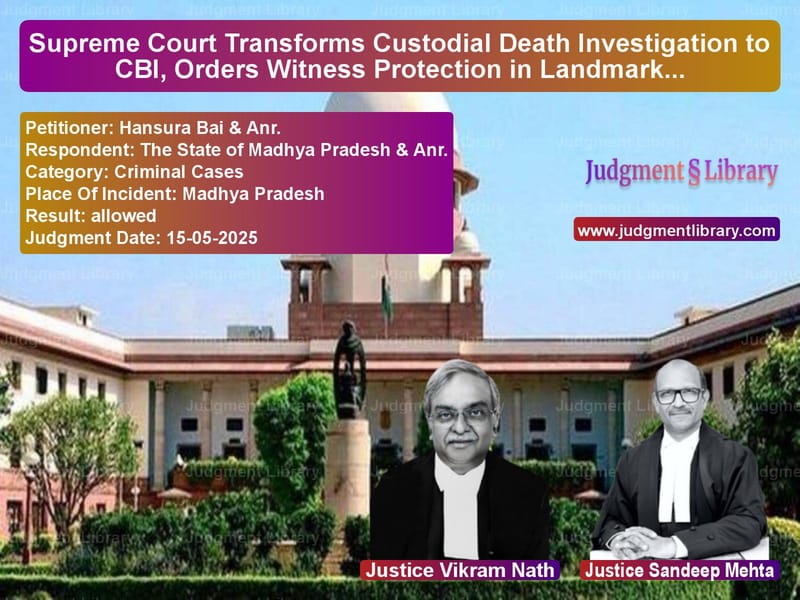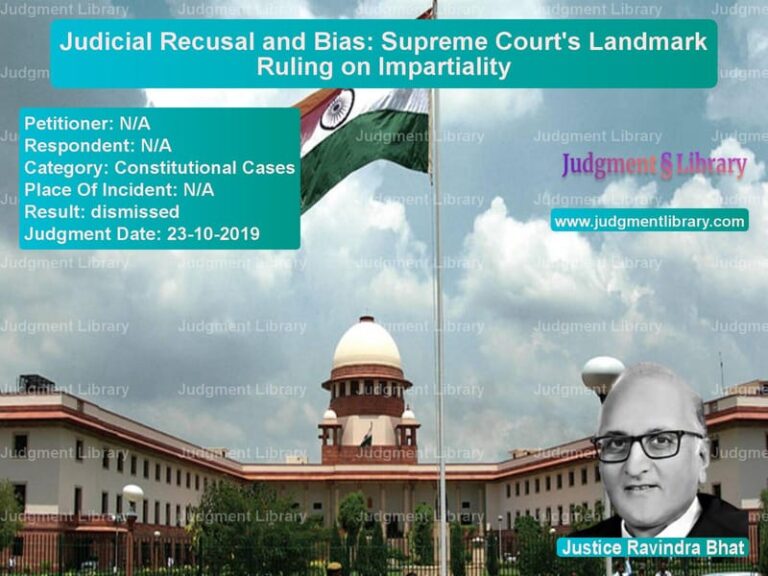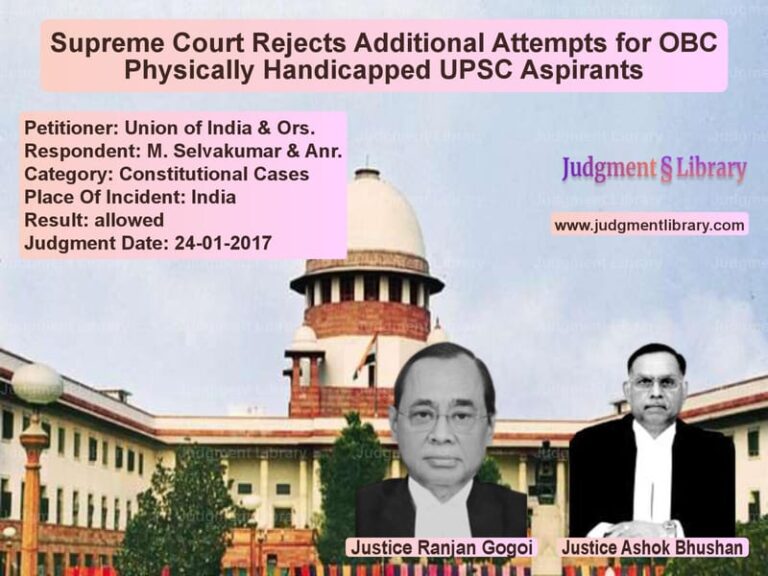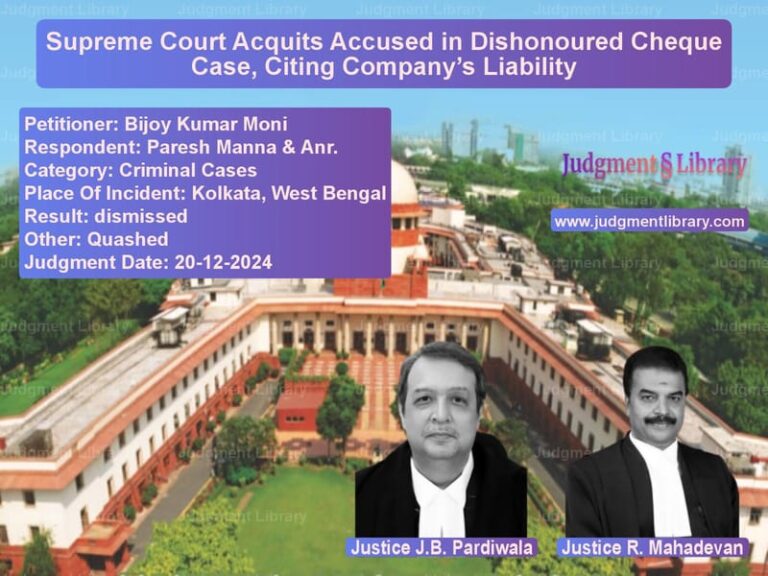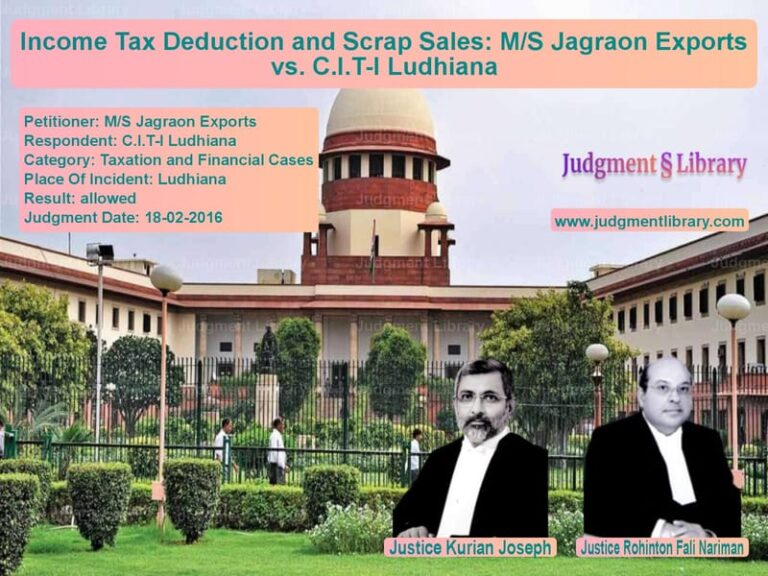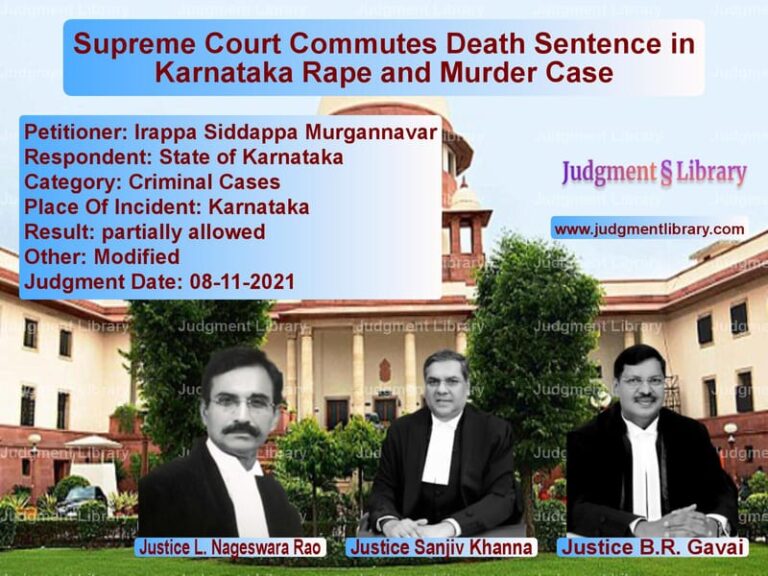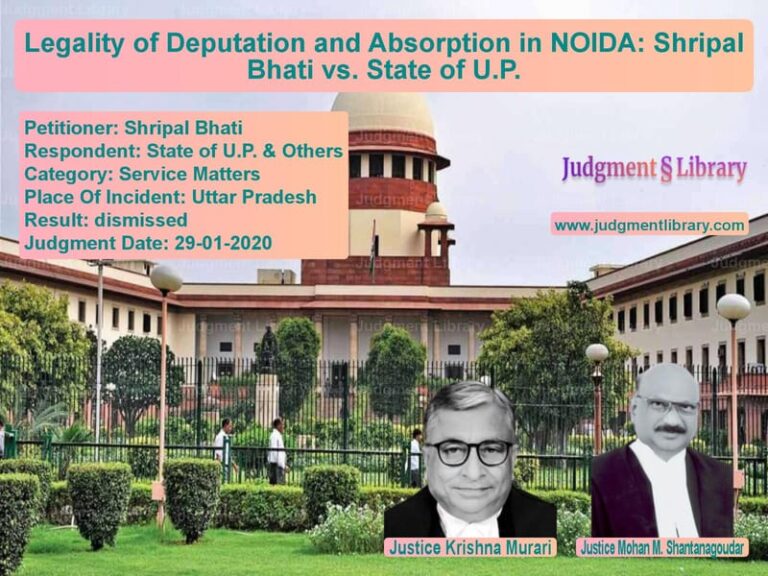Supreme Court Transforms Custodial Death Investigation to CBI, Orders Witness Protection in Landmark Ruling
In a powerful judgment that underscores the fundamental principles of justice and accountability, the Supreme Court of India has intervened decisively in a harrowing case of custodial death that shook the conscience of the nation. The case of Hansura Bai & Anr. versus The State of Madhya Pradesh represents not just another legal proceeding, but a stark reminder of the vulnerabilities faced by ordinary citizens when those sworn to protect them become their tormentors. This judgment, delivered on May 15, 2025, by a bench comprising Justice Vikram Nath and Justice Sandeep Mehta, stands as a testament to the judiciary’s role as the ultimate guardian of citizens’ rights and a bulwark against institutional impunity.
The tragic events that led to this landmark ruling began with what should have been one of the happiest occasions in a young man’s life – his wedding. Deva Pardhi, whose marriage was scheduled for July 14, 2024, became the victim of a brutal police operation that would ultimately claim his life. During the Haldi ceremony, a traditional pre-wedding ritual, approximately 30-40 police personnel descended upon the wedding venue in multiple vehicles. The scene quickly turned from celebration to terror as police officers handcuffed Deva Pardhi and his uncle, Gangaram Pardhi, and began assaulting them in front of their horrified family members, including women and children who were themselves manhandled when they tried to intervene.
The Horrific Custodial Torture
The nightmare only intensified after Deva Pardhi and Gangaram Pardhi were taken to the police station. Instead of being taken to the new Thana premises equipped with CCTV cameras, they were transported to the old Thana, suggesting a deliberate attempt to avoid electronic surveillance of what was to follow. The details of the torture, as documented in the Supreme Court judgment, are chilling in their brutality. Both men were subjected to intense third-degree treatment that included beating with ropes, and having chili powder, petrol, salt, and hot water applied to their bodies.
Deva Pardhi suffered particularly horrific treatment. The judgment records that he “was strung up by ropes and was hung upside down from the roof. His face was covered with a black cloth which was tied to his ankle using a string. He was repeatedly doused with water in an attempt to suffocate him.” For approximately three hours, this torture continued, with police officials pressuring him to confess to a theft reported by one Bhagwan Singh. When Gangaram Pardhi tried to intervene, stating they had no knowledge of the alleged theft, his protests were ignored.
The torture reached its fatal conclusion when the rope suspending Deva Pardhi was cut, causing him to fall from the roof onto the floor. Even then, the brutality continued as “hot water was thrown and salt was put on the wounds of Deva Pardhi who stopped responding to the torture stimuli upon which, the police officers pinched him.” When he remained unresponsive, he was moved to another room, and eventually an ambulance was called. He was declared dead upon arrival at the hospital.
The Legal Battle Begins
What followed the custodial death was a pattern familiar to those who have studied cases of police excesses in India – a systematic attempt to cover up the crime and intimidate witnesses. Gangaram Pardhi, the sole eyewitness to the entire episode, was produced before a magistrate more than 24 hours after his illegal detention and remanded to judicial custody. Meanwhile, the family’s attempts to file an FIR were thwarted by local police officials.
When a post-mortem was finally conducted, the doctors reported multiple contusions and abrasions on Deva Pardhi’s body but initially reserved opinion on the cause of death, later attributing it to “vasovagal shock leading to heart attack” – a conclusion that seemed incongruous with the extensive physical injuries documented. It was only after a magisterial inquiry that FIR No. 341 of 2024 was registered, though notably, the offense of culpable homicide amounting to murder was omitted from the charges.
In a disturbing development that the Supreme Court would later characterize as a deliberate attempt to intimidate the key witness, Gangaram Pardhi found himself implicated in multiple criminal cases after the custodial death incident. Meanwhile, despite the registration of the FIR concerning Deva Pardhi’s death, not a single police official had been arrested even eight months after the incident.
Faced with this institutional resistance, the family – represented by Deva Pardhi’s mother Hansura Bai and his aunt – approached the Madhya Pradesh High Court seeking transfer of the investigation to an independent agency and bail for Gangaram Pardhi. The High Court, while acknowledging the threat perception faced by Gangaram Pardhi and ordering his transfer to a different jail, declined both the request for transfer of investigation and the bail application. This led to the appeal before the Supreme Court.
Arguments Before the Supreme Court
Before the Supreme Court, Ms. Payoshi Roy, learned counsel for the appellants, presented a compelling case that laid bare the systematic attempt to subvert justice. She argued vehemently that “the entire endeavour of local police officials is to pressurize and coerce Gangaram Pardhi to give evidence in favour of the police officials who indulged in the brutal custodial murder of Deva Pardhi.”
She further contended that “Gangaram Pardhi is being entangled in multiple criminal cases, one after the other, so as to prolong his custody period and to subdue him into exonerating the police officials by changing his version.” Based on these submissions, she urged that “it is a fit case warranting transfer of investigation into the custodial death of Deva Pardhi to the CBI and to further direct grant of bail to Gangaram Pardhi, who has been entangled in the multiple false cases after the incident dated 13th/14th July, 2024.”
The State of Madhya Pradesh, represented by learned Additional Solicitor General Ms. Aishwarya Bhati, opposed these submissions. She informed the Court that “two of the involved police officials have been shifted to the police lines” but notably “did not dispute that other than transfer of the errant police officials, no realistic or firm measures whatsoever have been taken to bring the offenders to book.” Nevertheless, she urged that “the State police is fairly investigating the matter pertaining to custodial death of Deva Pardhi and all the errant police officials will be proceeded against as per law after investigation is complete.”
Regarding the threat perception, Ms. Bhati submitted that “the apprehensions being expressed regarding the threat perception being felt by Gangaram Pardhi, have been alleviated pursuant to the High Court order shifting him from Guna Jail to Gwalior Central Jail and thus, now there is no cause of concern in this regard.”
In a characterization that the Supreme Court would later implicitly reject, Ms. Bhati described Gangaram Pardhi as “a hardened criminal who is wanted in multiple cases involving grave offences and hence, the plea of innocence and false implication raised by the appellants is devoid of any merit.” She argued that Gangaram Pardhi should avail regular bail remedies rather than seeking relief through the Supreme Court’s extraordinary jurisdiction.
The Supreme Court’s Powerful Reasoning
The Supreme Court bench, after careful consideration of the arguments and evidence, delivered a judgment that pulled no punches in assessing the situation. The Court began by reiterating fundamental legal principles governing the transfer of investigations, noting that “credibility of investigating agency should be impeachable. Further, the power to transfer investigations to a certain investigating agency must be sparingly used in the interest of justice and to maintain public trust on the institution. If the investigating agency is privy to the dispute, it may raise doubts on the credibility of investigation and thus, make out a ground to transfer the investigation.”
The Court extensively referenced its earlier decision in Narmada Bai v. State of Gujarat, which had quoted with approval the principle that “Fair and impartial investigation by an independent agency, not involved in the controversy, is the demand of public interest. If the investigation is by an agency which is allegedly privy to the dispute, the credibility of the investigation will be doubted and that will be contrary to the public interest as well as the interest of justice.”
The bench made it clear that “this is a classic case warranting invocation of the Latin maxim ‘nemo judex in causa sua’ which means that ‘no one should be a judge in his own cause’.” The Court observed that “the allegation of causing custodial death of Deva Pardhi is against the local police officials of Myana Police Station. The fact that the police officials have influenced the investigation right from the beginning is amply borne out from the circumstance that even the doctors, who conducted autopsy of the dead body of Deva Pardhi, seem to have been pressurised/influenced.”
In a particularly sharp observation, the Court noted: “We are constrained to observe that despite taking note of the large number of the injuries on the body of Deva Pardhi, the victim of custodial torture, the members of the Medical Board which conducted post-mortem on his body, failed to express any opinion regarding the cause of his death. This omission seems to be deliberate rather unintentional and appears to be a direct result of influence being exercised by the local police officials.”
The judgment highlighted several alarming circumstances: the prevention of the family from filing an FIR immediately after the incident; the omission of the murder charge in the eventually registered FIR; the failure to arrest any accused despite eight months having passed; and the systematic implication of the sole eyewitness in multiple cases. The Court concluded that “these circumstances give rise to a clear inference that the investigation by the local police is not being carried out in a fair and transparent manner and there is an imminent possibility of the prosecution being subjugated by the accused if the investigation is left in the hands of the State police, who are apparently shielding their own fellow policemen owing to the camaraderie.”
The Court’s Directives
Based on this compelling analysis, the Supreme Court issued several crucial directives. First and foremost, it ordered that “the investigation of FIR No. 341 of 2024 shall forthwith be transferred to the Central Bureau of Investigation.” The Court mandated that “the jurisdictional Superintendent of Police, CBI shall forthwith direct registration of the RC and will ensure fair, transparent and expeditious investigation into the custodial death of Deva Pardhi.”
In a rare and significant move, the Court imposed strict timelines, directing that “the police officials found responsible for the custodial death shall be arrested forthwith and not later than a period of one month from today. The investigation shall be concluded within a period of 90 days from the date of the arrest of the accused.”
Regarding Gangaram Pardhi, the Court granted him liberty to approach the High Court for bail in all cases filed against him after the custodial death incident. Importantly, the Court directed the High Court to consider his bail applications keeping in mind the Supreme Court’s observations about the apparent pattern of implicating him to intimidate him as a witness.
Most significantly, the Court issued comprehensive witness protection directives, noting that “Gangaram Pardhi is the sole eye-witness to the torture and custodial death of Deva Pardhi and hence, it is the duty of the State to provide him protection on the anvil of the witness protection scheme.” The Court explicitly made “the responsibility to provide safety and security to Gangaram Pardhi, either in prison or after being released on bail, shall be that of the Principal Secretary (Home), Government of Madhya Pradesh and the Director General of Police, Madhya Pradesh.”
Broader Implications
This judgment represents a significant milestone in the Indian judiciary’s approach to cases involving police excesses and custodial violence. By transferring the investigation to the CBI, imposing strict timelines for arrests and investigation completion, and issuing specific witness protection directives holding senior officials personally responsible, the Supreme Court has set a powerful precedent.
The judgment reaffirms the principle that justice must not only be done but must be seen to be done. When the investigating agency itself is accused of the crime, the integrity of the entire process is compromised, necessitating intervention by an independent agency. The Court’s sharp observations about the medical board’s failure to determine the cause of death despite multiple injuries also sends a strong message to medical professionals about their duty to remain independent and truthful in such cases.
For ordinary citizens, particularly those from marginalized communities like the Pardhi community to which the victims belonged, this judgment offers a glimmer of hope that the system can indeed deliver justice even when powerful state actors are involved. For police forces across the country, it serves as a reminder that the era of impunity for custodial excesses may finally be coming to an end.
As the CBI takes over the investigation and the legal process moves forward, this case will undoubtedly be watched closely as a test of India’s commitment to accountability and the rule of law. The Supreme Court has done its part; now it remains to be seen whether the other pillars of the state will rise to the occasion to ensure that Deva Pardhi’s tragic death leads not just to punishment for the guilty, but to systemic reforms that prevent such atrocities in the future.
Petitioner Name: Hansura Bai & Anr..Respondent Name: The State of Madhya Pradesh & Anr..Judgment By: Justice Vikram Nath, Justice Sandeep Mehta.Place Of Incident: Madhya Pradesh.Judgment Date: 15-05-2025.Result: allowed.
Don’t miss out on the full details! Download the complete judgment in PDF format below and gain valuable insights instantly!
Download Judgment: hansura-bai-&-anr.-vs-the-state-of-madhya-supreme-court-of-india-judgment-dated-15-05-2025.pdf
Directly Download Judgment: Directly download this Judgment
See all petitions in Custodial Deaths and Police Misconduct
See all petitions in Bail and Anticipatory Bail
See all petitions in SC/ST Act Case
See all petitions in Attempt to Murder Cases
See all petitions in Judgment by Vikram Nath
See all petitions in Judgment by Sandeep Mehta
See all petitions in allowed
See all petitions in supreme court of India judgments May 2025
See all petitions in 2025 judgments
See all posts in Criminal Cases Category
See all allowed petitions in Criminal Cases Category
See all Dismissed petitions in Criminal Cases Category
See all partially allowed petitions in Criminal Cases Category

